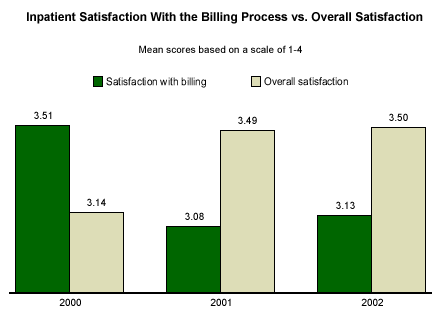What should hospital patients expect from their hospital stay? In order to help healthcare consumers answer that question, the American Hospital Association (AHA) has developed a brochure titled, "Patient Care Partnership: Understanding Expectations, Rights and Responsibilities." The brochure defines six areas of patient expectations:
- high-quality hospital care
- a clean and safe environment
- involvement in your care
- protection of your privacy
- help when leaving the hospital
- help with your billing claims
The core survey items for ║┌┴¤═°’s patient loyalty measurement system incorporate each of these six areas, with one exception: billing. Satisfaction with the billing process is an optional ║┌┴¤═° survey item, and fewer than five ║┌┴¤═° hospital clients included it in their surveys in 2002.
According to the ║┌┴¤═° healthcare database, satisfaction with the billing process has been relatively stable over the past three years. But compared with overall satisfaction, billing satisfaction is low.

Because only a small number of hospitals include the billing question in their surveys and the sample size is low, care must be taken in interpreting the results. It is possible that the only hospitals asking the billing satisfaction questions are the ones with billing problems. Nonetheless, the low scores on billing satisfaction merit a closer examination.
Creating a Positive Billing Relationship
The AHA brochure outlines what patients should expect from their hospitals when it comes to billing. Those expectations include filing patient claims with health insurers and other physicians, answering questions about bills, and providing doctors with documentation needed for billing. If a patient does not have health coverage for a procedure, hospitals are expected to help the patient make financial arrangements or provide other assistance.
A hospital that fails to meet these expectations is likely to receive low patient satisfaction ratings on billing. But implementing systems that address the expectations listed above may not be enough. Other issues may contribute to dissatisfaction with billing:
- The cost of healthcare is a major concern. Individual hospitals are not responsible for this problem, but it certainly affects them. Hospital care is expensive, and when patients receive these large bills, they may not know who else to blame. If the billing process doesn’t include adequate communication with patients in advance of receiving the bill, they may experience severe "sticker shock."
- Bills must be accurate. Patients tend to have the most negative and emotional reactions when they believe that their bills contain errors.
- Patient satisfaction is more related to people than it is to process. Good processes set up staff members for success, but interaction between patients and staff members makes the difference between satisfaction and dissatisfaction. Because interaction often occurs when patients have complaints, staff members must have the talents needed to resolve the conflict -- they must be good communicators and good listeners, and they must make patients feel like they care.
Issues With Measuring Billing Satisfaction
There are two reasons why satisfaction with the billing process is not a core ║┌┴¤═° item. First, in order to be part of the core survey, an item must be a key predictor of patient loyalty and other business outcomes, and ║┌┴¤═° research shows that billing questions do not fit this criterion. Although the billing process is important, other items, including satisfaction with helpfulness and courtesy of staff and satisfaction with the nurses’ care and compassion, are arguably more important to a patient’s overall level of satisfaction.
Second, scheduling issues make it difficult to efficiently measure satisfaction with billing. The goal of patient satisfaction measurement is to obtain valid responses as quickly as possible after the patient’s hospital experience is complete. Therefore, patients are often interviewed before they receive their bills. The outcome is a large number of "not applicable" and "don’t know" responses on billing questions, which could impact the validity of the results.
Bottom Line
It may be that an overall patient satisfaction and loyalty instrument, like the one ║┌┴¤═° uses, is not the best vehicle for gauging satisfaction with the billing process. Nevertheless, improving that process is a valid approach for helping to meet patient expectations -- after all, receiving the bill may be the last contact a patient has with the hospital, so unpleasant surprises may leave a lasting negative impression.